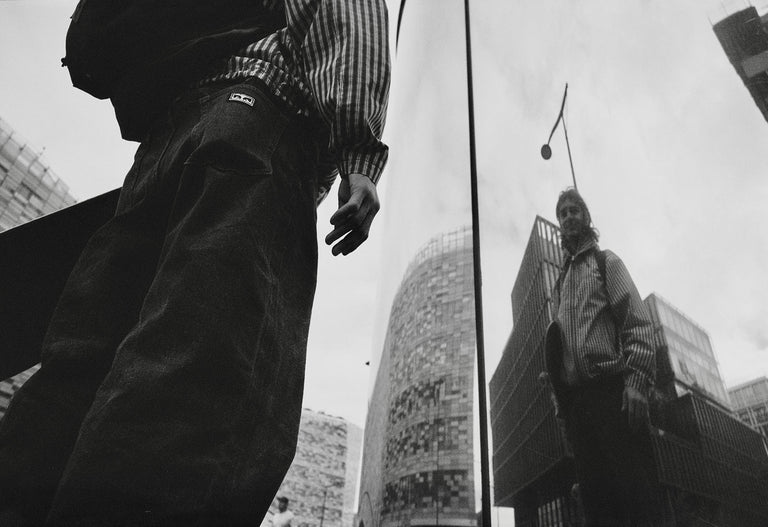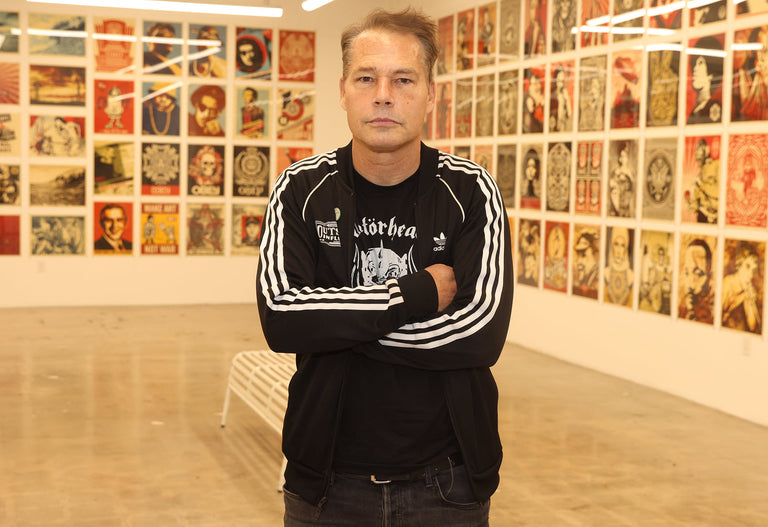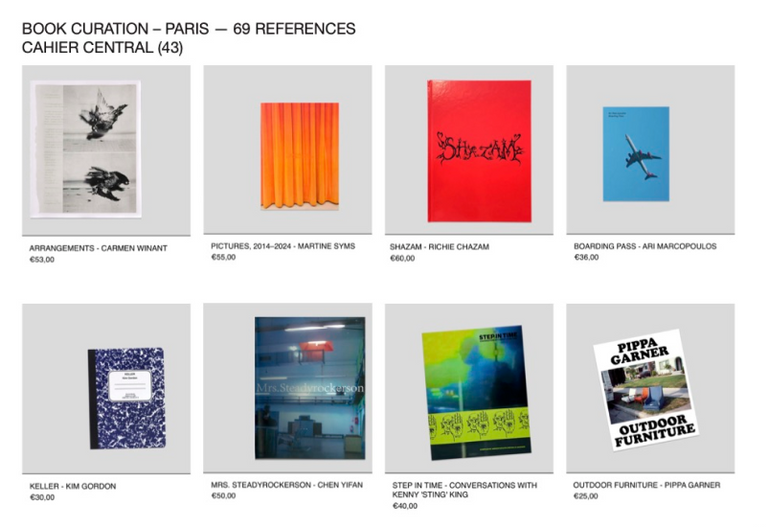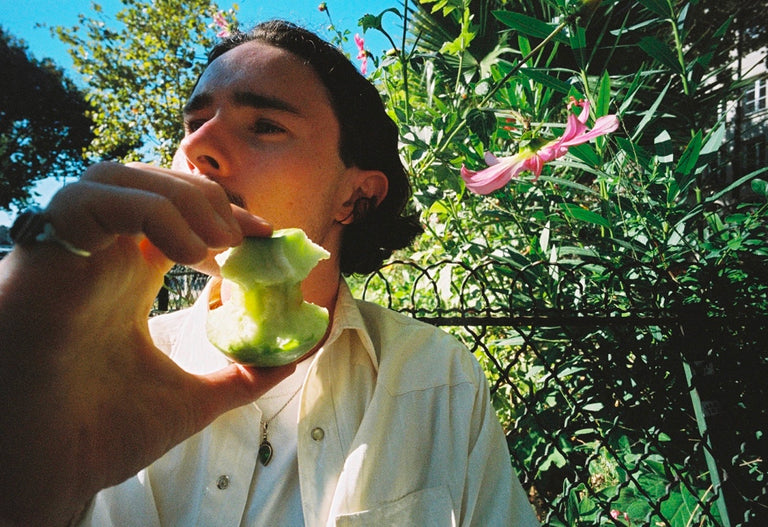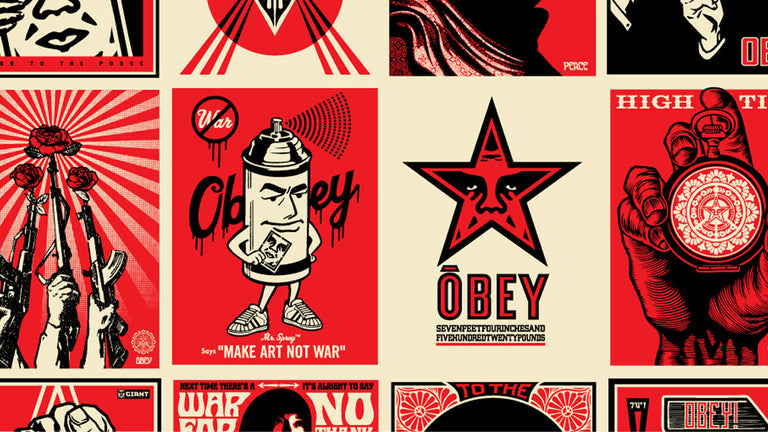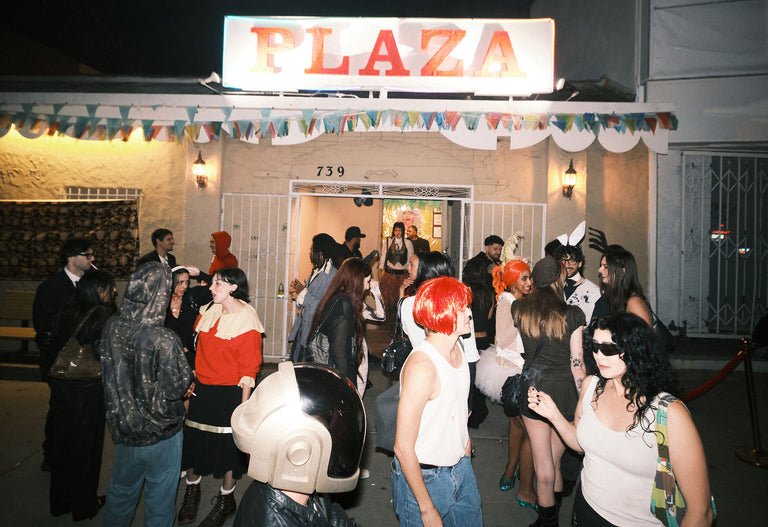Shepard Fairey’s striking Defend Dignity poster, created for The Amplifier Foundation’s We The People campaign, has been on the news and in the streets since Inauguration Day. From the Women’s March to #NoBanNoWall, the piece has continued to resonate at marches and protests across the U.S. and the world.
Shepard collaborated on the piece with photographer Arlene Mejorado, who captured the original image of Maribel Valdez Gonzalez used in the poster. We were lucky enough to catch up with them both for a quick Q & A, to get more background on the image, hear how they feel about the campaign, and talk about how people can be more involved politically.
The Defend Dignity Tee is available for purchase in men’s and women’s sizes on obeyclothing.com. As a part of our OBEY Awareness program, 100% of net profits from sales will be donated to the Amplifier Foundation.
See both tees here: http://obeyclothing.com/collections/we-the-people-tees

Maribel Valdez Gonzalez at the opening of Shepard Fairey’s “American Civics” show. Photo by Jonathan Furlong.
Q: Tell us a little about yourself! Where are you from? What do you do? What are your passions?
Gonzalez: I am a first generation Xicana educator in San Antonio, Tejas. I became a teacher because I believe historically looted black and brown youth can become leaders of today and the future when they are empowered. They are empowered when they realize that their identity, experiences, and respective histories carry immense power and meaning for our communities. Being an educator in a Title 1 public school requires empathy and compassion because we accept everybody. It requires an understanding that statewide standards, funding, and testing used to assess the learning that goes on in our campuses are unequitable in practice.
Q: What does the We The People Campaign mean to you? The Amplifier Foundation aims to support starting conversations in communities on political/social justice issues and they want to empower social change through art. What’s your take on that?
Gonzalez: Art is the language of creation and it is representative of the beauty of our humanity. When dialogue and criticism can be difficult to comprehend, art can serve as a facilitator of change and how we perceive the world. Artists have an important role in movements and social change. I believe they have a responsibility to act in solidarity with communities that are vulnerable to systemic violence. Black, brown, queer, trans, gender non-conforming, native, and migrant communities have been in the struggle for our right to thrive throughout the entire existence of the United States of America regardless of who is president. All of us, including our most privileged, will not be free unless our most marginalized is free. I support the We the People Campaign and its success in uniting all of our communities during the inauguration of Donald Trump and the Women’s March on Washington. While that was a success, that was just one weekend. The real change begins when folks begin to believe queer, trans, and migrant womxn of color when they lead, when they speak up and out, and when they stand strong against white supremacy.
Q: What is your relation to the photographer Arlene Mejorado? What was happening at the time the image was captured.
Gonzalez: Arlene is a talented and powerful photographer, artist, storyteller, and scholar. She was working on a project documenting her mother’s migration story from Mexico. Her mother crossed the border by holding a child that wasn’t hers but she pretended the white-passing baby was hers. Arlene’s mama was holding the white-passing baby on her lap in the backseat of a car when she crossed. I was asked to represent her mother in the photograph. Her mother’s story is very similar to my mother’s story. I hadn’t even thought to ask my mother how she crossed the border until Arlene asked me to be a part of her project. My mother along with other women crossed the Laredo border by telling border patrol her and “her girlfriends” were going shopping. We come from a line of really fierce strong women. Resiliency is in our blood. Migration is about cultivating a better life for ourselves. It is about our agency as human beings. Art helps tell our stories as women of color. I never see myself or my mother in mainstream media. Artists like Arlene are so important to our community. We need to elevate and support the work of queer, trans, and migrant womxn of color artists. Representation matters.
Q: What does the term “Defend Dignity” mean to you? What are your thoughts on Shepard Fairey incorporating the phrase into his piece?
Gonzalez: Defending dignity is defending our right to thrive. It is about human decency. Dignity is about our right to work with fair living wages. Dignity is about being able to provide for our families. Dignity is about our right to migrate to wherever we choose to live better lives and live free from violence. It is about respecting our right to pray however we want to pray. Defending dignity is about defending the cleanliness of our water for our future generations. It is about respecting the treaties that define the relationship between native communities and the United States. Defending dignity is about respecting the way that we all want to live at the intersection of race, class, identity, migrant status, gender identity, and sexuality. Right now, many communities are experiencing an attack on their right to live and thrive. Many communities are experiencing direct and indirect violence as a result of rhetoric that is being normalized in mass media. I believe Shepard Fairey chose to incorporate “Defend Dignity” into the campaign because he recognized the need to defend the right for all communities to thrive, live, and work.
Q: What are some ways you would like to see people get involved to make their voices heard and stand up for injustice?
Gonzalez: Get involved every single day. Don’t be a bystander when you see violence. Call your local, state, and federal representatives. Let them know how you feel about the executive orders being signed, laws in the process of being passed, and language that is being used to spread lies about the communities used as scapegoats for this country’s problems. Speak up and out about defending public schools, DACA, ethnic studies, anti-police brutality accountability, anti-discrimination laws for LGBTQ, Standing Rock, and Two Rivers camp. Support organizations that are led by queer, trans, and migrant black and brown womxn. Again, we won’t be free unless our most vulnerable are free. An important step towards justice and equity for all is truly trusting and believing womxn of color when we say there are injustices. White supremacy isn’t going to disappear if we only listen to each other when we understand.

Arlene Mejorado signing posters with Shepard Fairey. Photo by Ayse Gursoz.
Q: Tell us a little about yourself. Where are you from, how did you get into photography.
Mejorado: I was born and raised in the San Fernando Valley which is the most northern part of Los Angeles. My father crossed the border as a baby from Durango, Mexico and my mother crossed as a teenager from Jalisco. I was raised by my mother and my first language was Spanish. I learned English by watching cartoons and taking ESL in elementary school. My mother had a retail space at the Van Nuys swap meet where she sold toys. On the weekend I would go with her to downtown LA in the Santees/Callejones to buy more inventory. I was about 7-8 years old and I remember being extremely observant to my surroundings. I have always been a people watcher and as a child I became enamored with the streets of Los Angeles and all of its daily madness and regular routine. I believe before I touched a camera, my naked eye was the camera. I started with 35mm film around 2010 and would develop my own negatives and pictures then I bought my first DSLR in 2013 and have not put it down since. It is a tool of fast production. I started with candid street/urban photography and progressed into portraiture of both people I know and strangers I encounter.
Q: What subjects and topics do you like to explore through your work.
Mejorado: I am interested in communities that are thriving, that generate culture or subcultures but exist outside of a mainstream experience. I have always looked to immigrant communities and especially Black and Brown people for inspiration and content. I am also interested in people that live outside of binaries such as genderqueer and multi-racial experiences. I believe my work is rooted in social justice and challenges certain traditions in documentary photography as a brown woman photographing communities of color.
Q: Can you give us a little background on the image you captured that was used in the Defend Dignity piece.
Mejorado: This is a portrait of one of my best friends and a fierce woman named Maribel and it was taken last year in San Antonio Texas. It is part of a series of portraits I have taken of community members that I believe do progressive and revolutionary work through the arts, education, research, and more. Gonzalez is a passionate middle school teacher in an underserved San Antonio school. I watch her go above and beyond for her students. She is a first generation Mexican-American and self identified Xicana of Native American descent. Gonzalez has taught me a lot about the resilience and healing power of women of color. She is bold and brilliant. She claims her place in society despite the fact that she was an at-risk youth that came close to being another statistic. Latina women are the highest incarcerated woman population in this country. Latina single mothers represent the poorest demographic in the US. Thousands of Latin American, Native, and Afro-Latina women and children are being detained in inhumane conditions in Immigration Detention Centers across the country. Maribel Valdez Gonzalez is a brave woman living in Texas, in the south, in a red state.
Q: How was your experience working with Shepard Fairey and The Amplifier Foundation.
Mejorado: Working with Shepard Fairey was a great experience. Fairey listened to my creative input for the image and even made some alterations per my suggestion. He made sure me and Maribel were happy with the final image. The Amplifier Foundation provided a great opportunity and I plan to work with them again in the future. It was important to me and my community to feel valued and involved throughout the process and I feel that overall both Fairey and the Amplifier Foundation put that effort forward to work as a team.
Q: What way would you like to see people get involved politically to “Defend Dignity” and promote positive change.
Mejorado: I think right now people need to get involved through every aspect of their life. We need civic engagement as much as we need to look in the mirror. Lets ask ourselves what we can do to change ourselves so that we can change the world. We need to work on our self-esteem. Right now we are being told to hate ourselves. We are being encouraged to hate others and to fear others. We need to undo the misogyny, anti-blackness, xenophobia, and Islamophobia that tries to seep into our own lives. We need to really engage in uncomfortable conversations at the dinner table, with co-workers and friends. Right now youth need mentors, community organizations need volunteers, immigrant rights groups need help. We should be reaching out with our hands and our pockets. People need to engage in boycotts, protests, and political organizing. And artists need to make revolutionary art and reach as many people as possible. We should all collaborate where we can.
